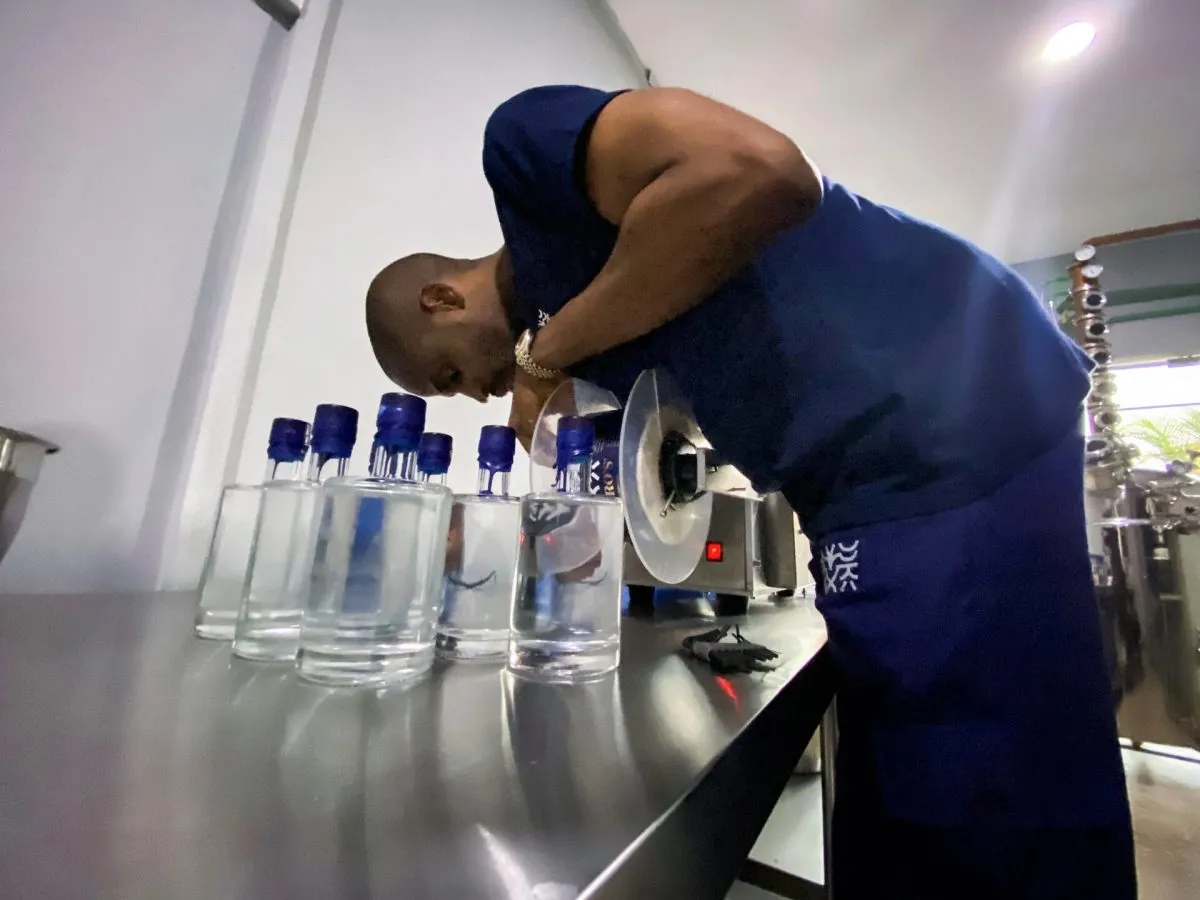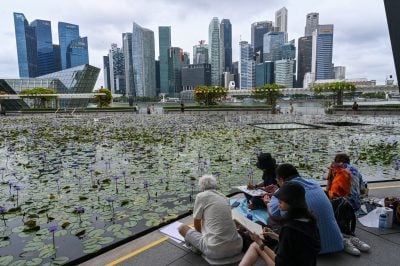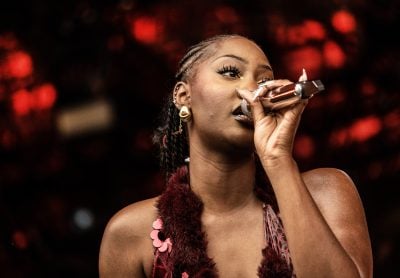As the ski season wound down in April, a video surfaced on Instagram showing a group of holidaymakers sipping Pedro’s premium ògógóró on the snowy slopes of the French Alps. Wrapped in ski jackets and speaking in a mix of Lagosian, London and American accents, they passed around the subtly smoky Nigerian spirit, laughing and toasting as if defying both gravity and history.
The moment was unscripted, raw, and oddly poignant: a drink that was once the equivalent of Nigerian moonshine turned into a premium brand, and now drunk in one of Europe’s most exclusive playgrounds.
Lola Pedro, the British-Nigerian co-founder of Pedro’s, didn’t know who the skiers were. But she wasn’t surprised. “Nigerians are everywhere,” she said. “And Pedro’s always finds its way into a suitcase.” Pedro’s is part of a new generation of African-owned spirits reshaping perceptions of what the continent can produce and export. Across Nigeria, Ghana, Zimbabwe and South Africa, local entrepreneurs are reclaiming indigenous ingredients and traditions long dismissed as informal, illicit, or inferior. Their brands fuse authenticity with innovation, aiming to capture their slice of the global premium market while staying rooted in cultural memory.
Cult following
In Lagos, Pedro’s has become a cult favourite among a certain crowd – discerning drinkers, diaspora returnees, and travellers looking for something more immersive than imported cognac. But the path from palm to polished bottle hasn’t been easy.
Pedro’s is distilled from palm sap, traditionally fermented and fired in bush stills. Pedro and her business partner Chibueze Akukwe wanted to preserve that heritage while refining the product so that it could sit on shelves in Selfridges. “We didn’t want to just repackage ògógóró. We wanted to elevate it,” Akukwe says. “But there was no roadmap. The Nigerian authorities weren’t sure how to regulate us. Exporting spirits made entirely in Nigeria? That’s still basically unheard of.”
Despite these barriers, Pedro’s has made its way to Ghana, the UK, Kenya and as far away as Australia. In the UK, a bottle sells for £60 ($80). In Lagos, it’s less than half that. Social media has helped, but the team deliberately scaled back online activity last year. “We were tantalising people we couldn’t supply,” Pedro says. “So now we’re focusing on building the foundations, scaling our production, setting up a bigger distillery, and launching an aged line that will take us to another level.”
For generations, the palm tree has been at the centre of life in West Africa. Its wood builds homes, its leaves roof them, its fruit flavours meals and powers fires. But it’s the sap – slowly tapped from the tree and drunk fresh as palm wine – that carries the most cultural weight. Distilled, it becomes ògógóró in Nigeria or akpeteshie in Ghana: a potent, clear spirit traditionally made in villages and shared at weddings, funerals, and festivals.
During the colonial era, British authorities outlawed these spirits, citing vague concerns over purity and public health. In practice, the bans were seen by many as a way to undercut local industry and protect imports of Scotch and London dry gin. Production went underground. Bottles were unlabelled, recipes passed down orally, and the drinks became shorthand for back-alley swigs and rough edges.
Even now, ògógóró is often misunderstood – grouped with moonshine or dismissed as unsafe. But in truth, says Pedro, the best batches are artisanal, small-run, naturally fermented from palm sap and double-distilled over firewood in handcrafted stills. No additives. No shortcuts. Its flavour is earthy, dark chocolatey and smoky, with a kick that lingers.
Still tastes like home
Brands like Pedro’s are trying to reclaim that legacy – not by hiding the drink’s roots, but by celebrating them. “We asked ourselves,” Pedro says, “how do we make an ògógóró that holds its own against the world’s best spirits – but still tastes like home?”
The timing may be fortuitous. The global spirits industry is predicted to grow from $152.3bn in 2024 to $161.23bn in 2025, at a compound annual growth rate of 5.9%, says the Business Research Company.
Ultra-premium bottles now account for nearly 5% of total market value, according to drink data firm IWSR.
In South Africa alone, local spirits exports to markets like Zambia, Mozambique and Brazil grew by over 25% last year, according to IWSR. And while African spirits still represent a fraction of global volumes, they’re capturing attention. In Africa, premium spirits make up just 4% of volumes but contribute nearly 20% of value says IWSR in its 2024 Beverage Alcohol in Africa report.
Christopher John Day, an analyst at Euromonitor, says the market for African spirits is stabilising after two years of intense growth, driven in part by rising disposable income and a desire among affluent Africans to display their status with local brands.
“There’s a strong sense of identity and storytelling embedded in these spirits,” he says. “International brands can’t replicate that. But competing with [global brands] on price, scale, or distribution is still a big challenge.”
In South Africa, Spearhead Spirits has won praise for Bayab Gin and Vusa Vodka, which use indigenous botanicals and source ingredients from local farmers. Zimbabwean sommelier Tinashe Nyamudoka has gained global recognition for Kumusha Wines. And in Ghana, Amma Mensah has turned Reign Rum into a luxury product aged in cashew brandy barrels, wrapped in Ashanti symbolism. South Africa’s Three Ships Whisky continues to rack up global awards.
“The tactic we’re seeing now is that smaller African brands are identifying niche categories where the big international players haven’t consolidated themselves yet,” Day adds. “That’s where local producers can really carve out space — but it takes time.”

Authenticity and backstory
Day says African brands also benefit from shifting global tastes. “Consumers, particularly in markets like the US and UK, are looking for authenticity and backstory — something that feels rooted in place and people,” says Day. “That gives African spirits a real edge, if they can get past the export and distribution barriers.”
But most of Africa’s spirit brands still operate in small batches, not because they want to, but because navigating local logistics, taxation, and regional distribution is maddeningly complex, says Akukwe. The African Continental Free Trade Area (AfCFTA) offers a potential lifeline, but as Pedro’s experience shows, even basic export rules remain opaque.
“The system is designed for us to ship raw materials and have the value added somewhere else,” Akukwe says. “But we’re trying to do everything from scratch in Nigeria – tap the palm, distil, bottle, and ship. And that’s disruptive.”
Pedro’s is currently working with Nigerian authorities on securing geographical indication status for ògógóró, much like tequila in Mexico or champagne in France. That could give Nigerian spirits international legitimacy and protection.
“We’re building a new facility outside Lagos that’ll be part distillery, part destination,” Pedro explains. “Like going to a vineyard. You’ll see the tapping, the bush distillation, the refinement. It’s not just a drink – it’s culture.” Their next big push is this December, when diaspora Nigerians flood home for what’s colloquially known as “Detty December”. Lagos fills with rooftop parties, imported DJs, and flowing bottles of foreign liquor. “We’re not the sparkler crowd,” says Pedro. “Pedro’s is for sitting down with your friends and reconnecting with your roots. Not doing shots. It’s a thinking person’s drink.” But the sales opportunity of Detty December remains.
Even at home, building that trust hasn’t been easy. Many Nigerians, aspirational and image-conscious, have historically preferred foreign labels. But inflation and import bottlenecks have made Pedro’s unexpectedly attractive. “We saw a spike in sales when international booze got more expensive,” says Akukwe.
The product itself continues to evolve. Each harvest yields a different flavour – a consequence of climate, palm variety, and fermentation. The latest batch tastes like dark chocolate, they say. For the first time, they’re printing a special sticker to mark the vintage.
The goal isn’t just to compete with foreign brands, but to redefine premium African spirits. “We want people to know ògógóró the way they know tequila or mezcal,” Pedro says. “And we want them to drink it with pride.” On the ski slopes, they already are.
Want to continue reading? Subscribe today.
You've read all your free articles for this month! Subscribe now to enjoy full access to our content.
Digital Monthly
£8.00 / month
Receive full unlimited access to our articles, opinions, podcasts and more.
Digital Yearly
£70.00 / year
Our best value offer - save £26 and gain access to all of our digital content for an entire year!

 Sign in with Google
Sign in with Google 



